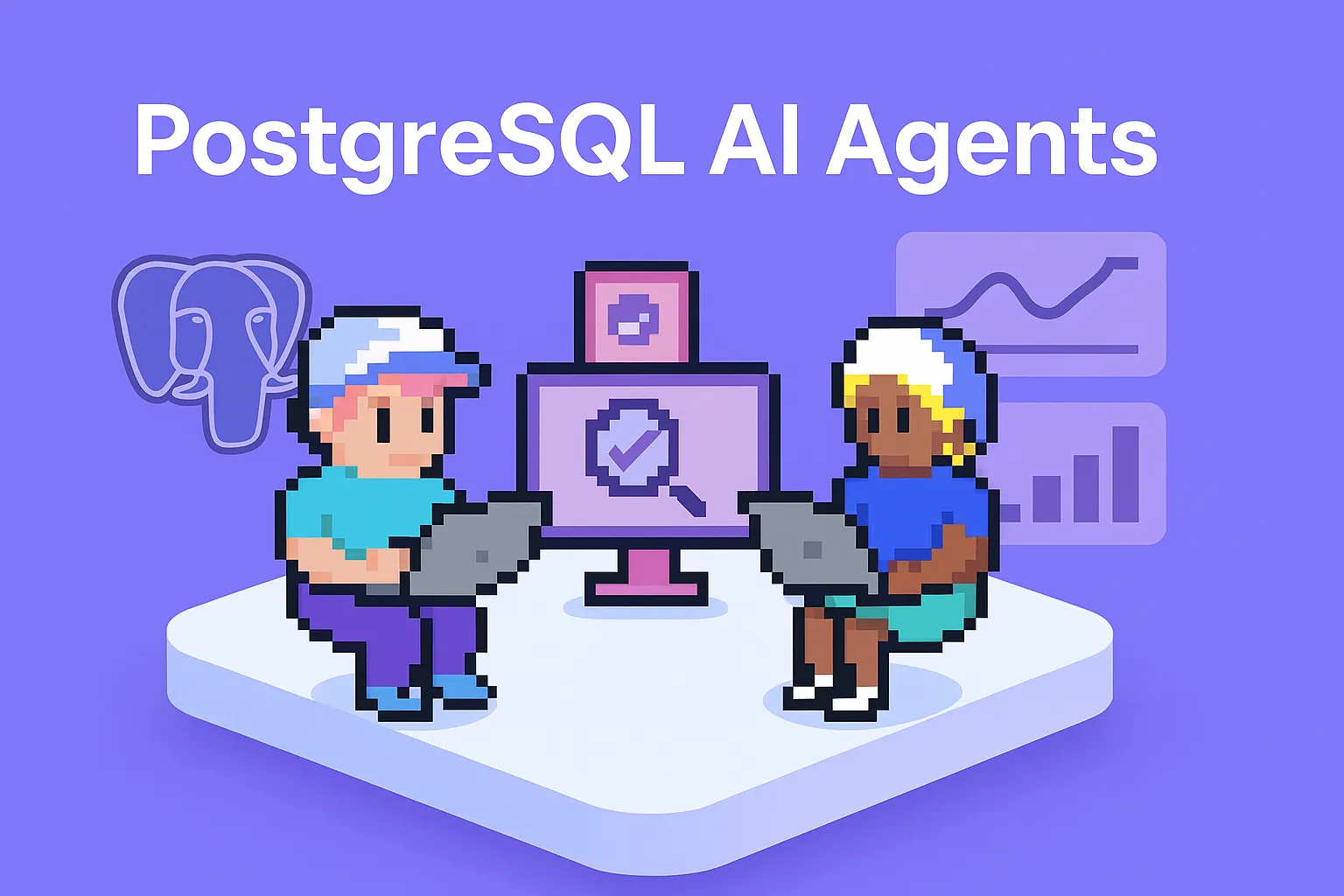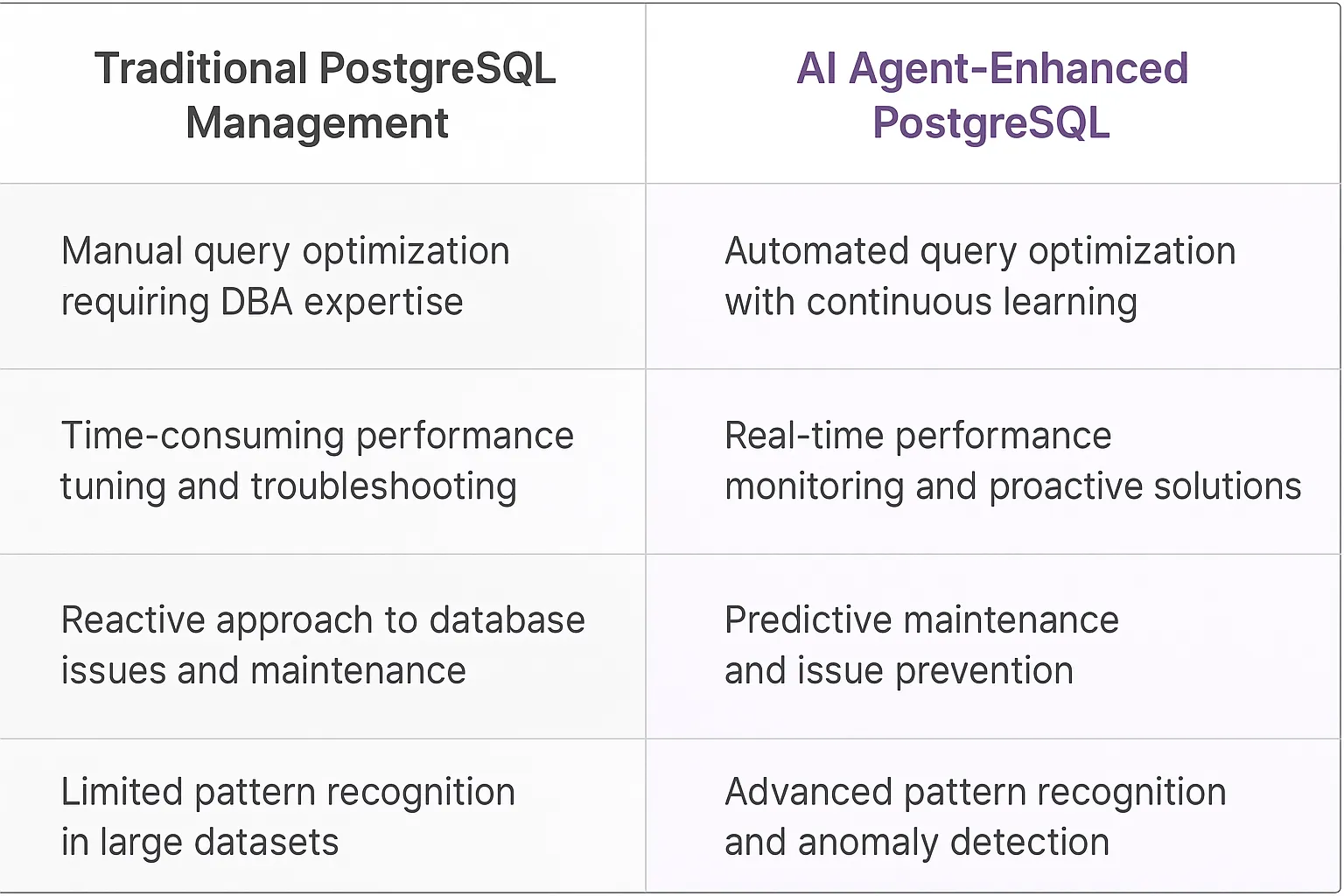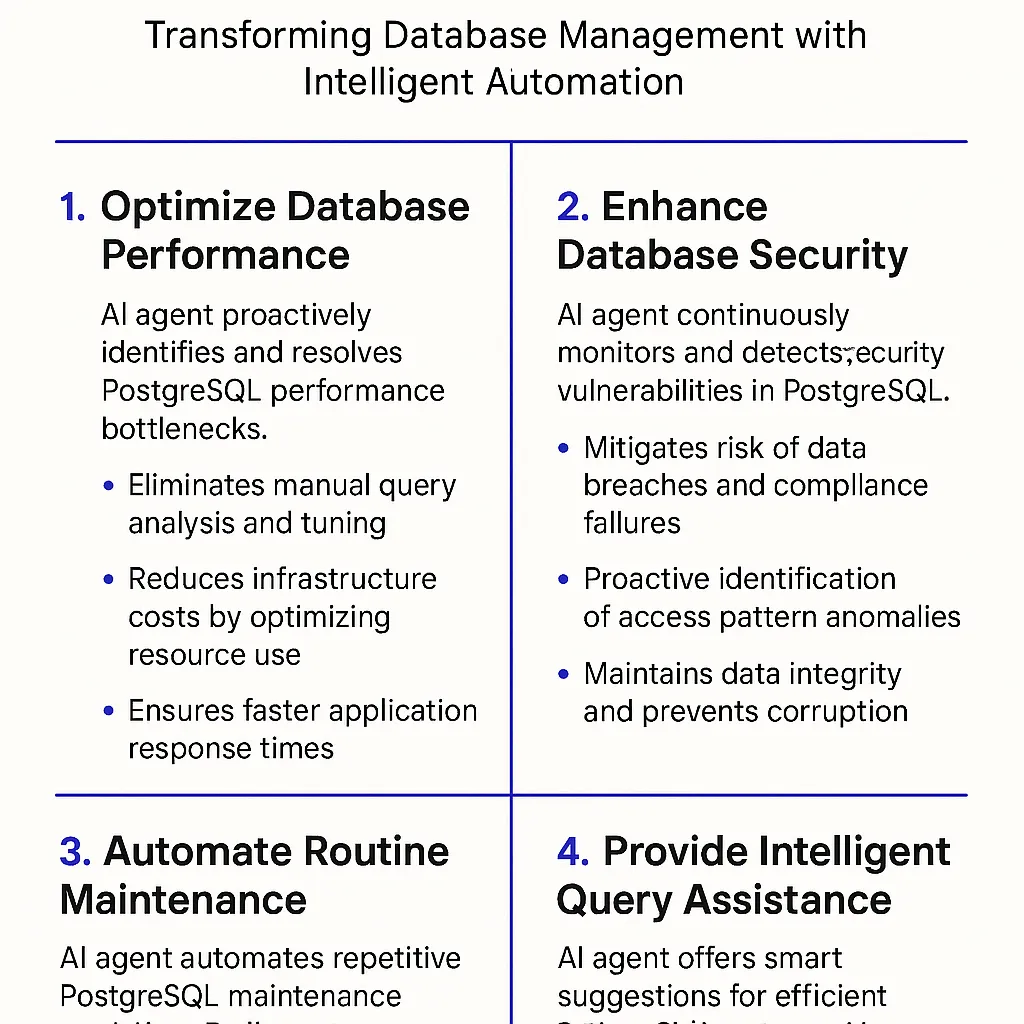PostgresSQL AI Agents
Understanding PostgreSQL
PostgreSQL is an advanced, open-source relational database management system. It's known for its robustness, extensibility, and compliance with SQL standards. PostgreSQL supports complex queries, foreign keys, triggers, and views, making it a popular choice for enterprises handling large-scale data operations.
PostgreSQL boasts an impressive array of features that set it apart in the database world. These include:1. ACID compliance for data integrity2. Support for JSON and other NoSQL features3. Advanced indexing techniques4. Full-text search capabilities5. Concurrent control mechanisms6. Extensibility through custom functions and data types7. Multi-version concurrency control (MVCC) for better performanceThese features make PostgreSQL a versatile and powerful tool for modern data-driven applications.

Benefits of AI Agents for PostgreSQL
What would have been used before AI Agents?
Before AI agents entered the scene, PostgreSQL users were stuck in a world of manual query optimization, tedious performance tuning, and endless documentation diving. Database administrators and developers spent countless hours poring over execution plans, tweaking indexes, and wrestling with complex SQL statements. It was a time-consuming process that often felt like trying to solve a Rubik's cube blindfolded.
The traditional approach relied heavily on human expertise and intuition. DBAs would use built-in PostgreSQL tools like EXPLAIN and ANALYZE to dissect query performance, but interpreting the results and making effective optimizations required years of experience. For many teams, this meant either hiring expensive PostgreSQL specialists or accepting suboptimal database performance as a fact of life.
What are the benefits of AI Agents?
Enter AI agents for PostgreSQL, and suddenly we're playing a whole new ballgame. These digital teammates are like having a team of world-class DBAs working 24/7, but without the astronomical salaries or coffee addiction.
First off, AI agents bring superhuman pattern recognition to the table. They can analyze vast amounts of query data, identifying performance bottlenecks and optimization opportunities that would take humans weeks or months to uncover. This isn't just about speed – it's about depth and breadth of analysis that goes beyond what even the most caffeinated DBA could achieve.
But here's where it gets really interesting: AI agents don't just identify problems; they propose and implement solutions. They can automatically generate optimized queries, suggest index changes, and even predict future performance issues based on current trends. It's like having a crystal ball for your database, but one that's powered by machine learning instead of mystical energy.
Another game-changing benefit is the democratization of database expertise. With AI agents, you don't need a Ph.D. in computer science to optimize your PostgreSQL performance. These digital teammates can explain complex concepts in simple terms, making database optimization accessible to a wider range of developers and data professionals. It's like having a world-class mentor who's always available and never gets tired of your questions.
Perhaps most importantly, AI agents for PostgreSQL are constantly learning and evolving. They stay up-to-date with the latest PostgreSQL features and best practices, ensuring that your database is always running on the cutting edge of performance and efficiency. This continuous improvement means that the benefits of AI agents compound over time, creating a virtuous cycle of optimization that keeps your PostgreSQL implementation ahead of the curve.
In the end, AI agents for PostgreSQL aren't just tools – they're transformative technologies that are redefining what's possible in database management. They're turning what was once a complex, time-consuming process into a streamlined, intelligent operation that allows teams to focus on innovation rather than maintenance. And in a world where data is the new oil, that's not just an advantage – it's a necessity for staying competitive.

Potential Use Cases of AI Agents with PostgreSQL
Processes
PostgreSQL AI agents are game-changers for database management. They're not just fancy add-ons; they're digital teammates that can transform how we interact with and optimize our databases. Let's dive into some killer use cases that'll make you rethink your database strategy.
First up, query optimization. These AI agents can analyze your query patterns, index usage, and table statistics to suggest performance tweaks. They're like having a seasoned DBA on call 24/7, constantly fine-tuning your database for peak performance.
Next, consider automated schema design. AI agents can analyze your data and usage patterns to propose optimal table structures, relationships, and indexing strategies. This isn't just about saving time; it's about creating database designs that evolve with your data needs.
Data anomaly detection is another area where these agents shine. They can continuously monitor your data streams, flagging unusual patterns or potential data quality issues before they become major problems. It's like having a vigilant guardian for your data integrity.
Tasks
On the task level, PostgreSQL AI agents are equally impressive. They can handle routine maintenance tasks like vacuum operations and index rebuilds, scheduling them at optimal times based on usage patterns and system load.
These agents can also assist with query writing. Imagine describing your data needs in plain English, and having an AI agent generate the optimal SQL query. It's like having a SQL translator that understands both human intent and database intricacies.
Data migration planning is another task where AI agents excel. They can analyze your current database structure and data, then propose efficient migration strategies, including handling schema changes and data transformations.
Lastly, consider using AI agents for access pattern analysis. They can study how your applications interact with the database, identifying potential security risks or opportunities for caching and query optimization.
The potential of AI agents in PostgreSQL is massive. They're not replacing DBAs or developers, but augmenting their capabilities, allowing teams to focus on higher-level strategic work while the AI handles the nitty-gritty. As these agents evolve, we're looking at a future where databases aren't just stores of data, but active, intelligent partners in our data management strategies.

Industry Use Cases
PostgreSQL AI agents are reshaping how businesses interact with their databases, offering a level of intelligence and automation previously unattainable. These digital teammates aren't just fancy add-ons; they're becoming essential tools across various sectors. Let's dive into some concrete examples of how different industries are leveraging PostgreSQL AI agents to elevate their data game and drive real business outcomes.
From finance to healthcare, e-commerce to manufacturing, these AI-powered database allies are tackling complex queries, optimizing performance, and uncovering insights that humans might miss. They're not replacing DBAs but rather augmenting their capabilities, allowing teams to focus on high-value tasks while the AI handles the heavy lifting of database management and data analysis.
In the following sections, we'll explore how specific industries are putting PostgreSQL AI agents to work, solving unique challenges and unlocking new opportunities. These aren't hypothetical scenarios – they're real-world applications that are changing the way businesses operate and compete in data-driven markets.
Fintech's Data Revolution: PostgreSQL AI Agents in Action
The fintech industry is drowning in data, but starving for insights. That's where PostgreSQL AI Agents come in, acting as your digital data wizards. These agents aren't just query runners; they're the Sherlock Holmes of your database, uncovering patterns and anomalies that human analysts might miss.
Take fraud detection, for instance. Traditional methods often rely on static rules, leaving gaps for clever fraudsters to exploit. A PostgreSQL AI Agent, however, can continuously analyze transaction patterns, customer behaviors, and historical data in real-time. It's like having a tireless fraud analyst who never sleeps, eats, or takes coffee breaks.
But here's where it gets interesting: these agents don't just flag suspicious activity. They learn and adapt. Every confirmed fraud case becomes a lesson, refining the agent's understanding of what constitutes fraudulent behavior. This dynamic learning process means the system gets smarter with each passing day, staying one step ahead of evolving fraud tactics.
The real magic happens when you combine this with natural language processing. Imagine a risk analyst asking, "Show me all transactions over $10,000 from new accounts opened in the last 30 days." The PostgreSQL AI Agent translates this into a complex SQL query, executes it, and presents the results in a human-readable format. It's like having a bilingual interpreter who speaks both 'human' and 'database'.
But it doesn't stop at fraud detection. These agents can optimize loan underwriting processes, predict customer churn, or even suggest personalized financial products based on spending patterns. They're not replacing human decision-making; they're augmenting it, providing insights that would take teams of analysts weeks to uncover.
The bottom line? PostgreSQL AI Agents are turning fintech's data deluge into a strategic asset. They're not just tools; they're digital teammates that are reshaping how financial institutions operate, compete, and innovate. In an industry where data is the new currency, these agents are the ultimate money makers.
Healthcare's Data Diagnosis: PostgreSQL AI Agents Transforming Patient Care
Let's talk about healthcare. It's an industry drowning in data but often struggling to turn that information into actionable insights. Enter PostgreSQL AI Agents - they're not just query runners, they're the House M.D. of your database, diagnosing patterns and prescribing solutions that could revolutionize patient care.
Consider the challenge of predicting patient readmissions. Traditionally, this involves manual analysis of countless variables - patient history, treatment outcomes, social determinants of health - a task that's both time-consuming and prone to human error. A PostgreSQL AI Agent, however, can crunch through this data in real-time, identifying high-risk patients with uncanny accuracy.
But here's where it gets interesting: these agents don't just predict, they learn. Every patient outcome becomes a data point, refining the agent's predictive models. It's like having a resident who never sleeps, continually honing their skills with each new case.
The real game-changer is when we combine this with natural language processing. Imagine a doctor asking, "Show me all diabetic patients over 50 who've had an ER visit in the last 6 months." The PostgreSQL AI Agent translates this into a complex SQL query, executes it, and presents the results in a clinically relevant format. It's like having a medical translator who speaks both 'doctor' and 'database'.
But we're just scratching the surface. These agents can optimize resource allocation in hospitals, predict disease outbreaks based on population health data, or even suggest personalized treatment plans based on genetic markers and treatment efficacy data. They're not replacing clinical judgment; they're augmenting it, providing insights that would take teams of researchers months to uncover.
The implications are profound. PostgreSQL AI Agents are turning healthcare's data overload into a strategic asset. They're not just tools; they're digital teammates that are reshaping how healthcare providers operate, innovate, and most importantly, care for patients. In an industry where information can mean the difference between life and death, these agents are the ultimate lifesavers.
Considerations and Challenges in PostgreSQL AI Agent Implementation
Implementing a PostgreSQL AI Agent isn't just about slapping some machine learning on top of a database. It's a complex dance of technology, strategy, and operational finesse. Let's dive into the nitty-gritty.
Technical Challenges
First off, integrating AI with PostgreSQL is like trying to teach a fish to climb a tree. These systems weren't originally designed to play nice together. You're looking at potential performance hits as your AI agent crunches through massive datasets. And let's not even get started on the memory management nightmares – your server might just decide to take an impromptu nap mid-query.
Then there's the question of data quality. Your AI is only as good as the data it feeds on, and if your PostgreSQL database is a mess of inconsistencies and duplicates, well, garbage in, garbage out. You'll need to implement robust data cleaning and validation processes, which is about as fun as it sounds.
Operational Challenges
On the operational side, you're entering a whole new world of complexity. Suddenly, your database admins need to be part-time data scientists. They'll need to understand not just SQL, but also machine learning algorithms, model training, and the dark arts of feature engineering.
Monitoring and maintenance become exponentially more complex. It's not just about keeping your database running smoothly anymore – now you need to watch for model drift, retrain your AI periodically, and juggle the ever-changing landscape of AI tools and libraries.
And let's talk about scalability. As your data grows and your AI gets smarter, you'll need to scale both your database and your AI infrastructure. It's like trying to upgrade the engine of a car while it's speeding down the highway.
Ethical and Legal Considerations
Don't forget about the ethical minefield you're wading into. Your AI agent might start making decisions that affect real people based on the data in your PostgreSQL database. You need to ensure fairness, transparency, and accountability in your AI's decision-making process. And with data privacy regulations like GDPR and CCPA, you'll need to be extra careful about how your AI uses and processes personal data.
Implementing a PostgreSQL AI Agent is no walk in the park. It's more like a high-wire act over a pit of hungry alligators. But for those who can pull it off, the potential rewards in terms of insights, efficiency, and competitive advantage are enormous. Just make sure you're ready for the ride.
The Future of Database Management: AI Agents and PostgreSQL
The integration of AI agents with PostgreSQL marks a paradigm shift in database management. These digital teammates are revolutionizing how we interact with and optimize databases, offering superhuman pattern recognition, automated problem-solving, and continuous learning capabilities.
From fintech to healthcare, AI agents are proving their worth by tackling complex challenges like fraud detection and patient care optimization. They're not just tools, but transformative technologies that are redefining what's possible in data management.
However, the path to implementation is fraught with technical, operational, and ethical challenges. Organizations must navigate issues of data quality, scalability, and AI governance to fully harness the power of these agents.
Despite these hurdles, the potential rewards are immense. As AI agents continue to evolve, they promise to unlock new levels of efficiency, insight, and innovation in database management. In a world where data is king, mastering the use of AI agents in PostgreSQL could well be the key to staying ahead in the data-driven economy of the future.













